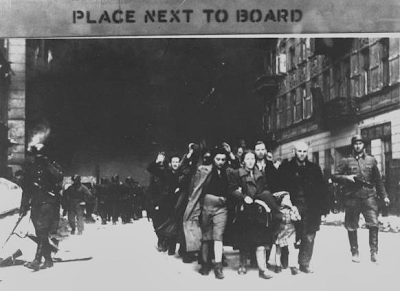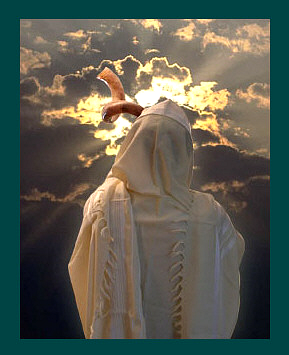
"O Lord, hear our voice in the morning;Originally, Selichot prayers were recited early in the morning, prior to dawn. There was a custom in Eastern Europe that the person in charge of prayers would make the rounds of the village, knocking three times on each door and saying, "Israel, holy people, awake, arouse yourselves and rise for the service of the Creator!"
It later became common practice to hold the first Selichot service - considered the most important - at a time more convenient for the masses of people. Therefore, the Saturday night service was moved forward to midnight.
The effect of a Selichot service can be quite moving. The mere gathering together of people at a time when they are usually asleep is impressive. We sense the extraordinary nature of the prayer and turn introspectively within ourselves. The prayers themselves are pleas for mercy. The melodies are sad and full of longing. Properly chanted, they form an oratorio expressing the despair that accompanies separation from God and the desire to change and repent. The self‑deprecation contained in the words, which express the feeling of life's fleetingness, and the burden of vanity that motivates so much of what one does, all cause us to ponder how we can break the cycle of our lives and change ourselves for the better. The possibility of change and of a better life is inherent in these prayers
in the morning we set them before You
with hopeful expectation. Hear our voice…"

SELICHOS, 1939
by Rabbi Avi Shafran
 September 1 marked 70 years on the Gregorian calendar since the German invasion of Poland that began the Second World War and the destruction of Eastern European Jewry.
September 1 marked 70 years on the Gregorian calendar since the German invasion of Poland that began the Second World War and the destruction of Eastern European Jewry.The war’s outbreak rudely interrupted the plans of millions, including those of a 14-year-old boy in a Polish shtetl. The boy – my father, may he be well – had been scheduled to travel to Bialystok to attend yeshiva.
He would eventually make it to yeshiva, in Vilna, but not before he, his family and all the townsfolk of Ruzhan would flee their town ahead of the advancing German army. On Friday, September 8, they found themselves in a town called Govrov, just before the Germans arrived there. The following Saturday night was the first night of Selichos – the special pre-Rosh Hashana supplications asking G-d’s forgiveness recited late at night or early in the morning before services.
I am preparing to publish my father’s memoirs (with G-d's help, this winter) – about his youth and flight from the Nazis, his yeshiva days, his war years’ sojourn in Siberia (as a guest of the Soviet Union), and his subsequent emigration to America and service as a congregational rabbi in Baltimore for more than 50 years
When I attend this year’s first Selichos services, on September 12 – actually, the 13th, since the special prayers will begin after midnight – my thoughts will be drawn to that first night of Selichos in 1939. I will be standing in a comfortable, beautiful shul in Staten Island. But I will be envisioning a place thousands of miles distant in space and seventy years in time.
 I will see a scene in my father’s memoirs:
I will see a scene in my father’s memoirs:… My family and I were lying on the floor of a local Jew’s house when we heard angry banging on the door and the gruff, loud words “Raus Jude! Raus Jude!” – “Jew, out!”
These visitors were not simple German soldiers, but member of the SS, the Schutzstaffel – the Nazi military organization that operated separately from the regular German army. SS members swore allegiance to Hitler, and they hated Jews.
The SS men chased us from the houses, prodding us with bayonets to raise our hands and join the town’s other Jews – several hundred people – in the middle of the town’s market area. As we walked, hands raised, the Nazis photographed us.
 Some of the Germans approached the men among us who had beards and cut them off, either entirely or purposely leaving an odd angle of beard, just to humiliate the victims. One man had a beautiful, long beard. When he saw what the Germans were doing, he took a towel he had with him and tied it around his beard, in the hope that our tormentors might not see so enticing a target. But of course, they went right over to him, removed the towel and shaved off what to him and us was a physical symbol of experience, wisdom and holiness. He wept uncontrollably.
Some of the Germans approached the men among us who had beards and cut them off, either entirely or purposely leaving an odd angle of beard, just to humiliate the victims. One man had a beautiful, long beard. When he saw what the Germans were doing, he took a towel he had with him and tied it around his beard, in the hope that our tormentors might not see so enticing a target. But of course, they went right over to him, removed the towel and shaved off what to him and us was a physical symbol of experience, wisdom and holiness. He wept uncontrollably.We stood there and the smell of smoke registered in our nostrils, becoming more intense with each minute. It didn’t take long to realize that the town’s homes had been set aflame. Later we heard that a German soldier had been discovered killed nearby and that the SS men had assumed that the culprits were Jews… We Jews were ordered into the synagogue… It became clear that all of us remaining in the synagogue were being confined there – the doors were locked and SS men stood outside to ensure that no one managed to escape – to be roasted alive… The town had been set afire, and the Nazis clearly intended to let the flames reach the synagogue. Houses nearby were already wildly burning…
The scene was a blizzard of shouting and wailing and, above all, praying. Psalms and lamentations and entreaties blended together, a cacophony of wrenched hearts. Everyone realized what was in store and there was nothing, absolutely nothing, that any of us could possibly do.
The smell of smoke grew even stronger as did the cries of the hundreds of Jews packed in the synagogue awaiting a terrible death. And then, a miracle occurred.
 How else to explain what happened? Those in the synagogue who were standing near the doorway and windows saw a German motorcycle come to a halt in front of the building. A German officer – apparently of high rank – dismounted from the machine and began to speak with the SS men guarding our intended crematorium. The officer grew agitated and barked orders at the other Nazis. After a few minutes, the doors to the synagogue were suddenly opened and, disbelieving our good fortune, we staggered out…
How else to explain what happened? Those in the synagogue who were standing near the doorway and windows saw a German motorcycle come to a halt in front of the building. A German officer – apparently of high rank – dismounted from the machine and began to speak with the SS men guarding our intended crematorium. The officer grew agitated and barked orders at the other Nazis. After a few minutes, the doors to the synagogue were suddenly opened and, disbelieving our good fortune, we staggered out…What made the officer order them to release us we did not know and never will. Some of us suspected he was not a German at all, but Elijah the prophet, who, in Jewish tradition, often appears in disguise.
We were ordered across a nearby brook… and were told to sit on the grass and to go no further. And so there we sat, all through the Sabbath, watching as the synagogue in which we had been imprisoned mere hours earlier was claimed by the flames and, along with all the Torah-scrolls and holy books of both Ruzhan and Govrov, burned to the ground…
That night was the first night of Selichos…

© 2009 AM ECHAD RESOURCES
[Rabbi Shafran is director of public affairs for Agudath Israel of America.]


No comments:
Post a Comment